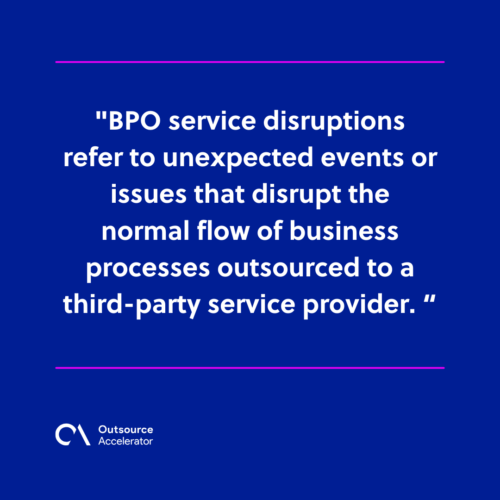How to handle BPO service disruptions

In a business environment, companies rely on business process outsourcing (BPO) services to streamline operations, reduce costs, and improve efficiency.
However, like any other aspect of business, BPO services are not immune to disruptions and challenges. When these occur, they can significantly impact a company’s operations and customer service.
This article will explore what BPO service disruptions are, provide examples, and discuss effective solutions to prevent and overcome them.
What are BPO service disruptions?
BPO service disruptions refer to unexpected events or issues that disrupt the normal flow of business processes outsourced to a third-party service provider.
These inconveniences can affect a company’s daily operations, customer satisfaction, and revenue. Businesses must be prepared for such disruptions to minimize their impact.

Examples of BPO service disruptions
Here are some real-world examples:
Technical issues
Technical issues are one of the most common forms of BPO service disruptions. These can include:
- Server crashes
- Software glitches
- Network outages
- Hardware failures
When these issues arise, they can lead to downtime, data loss, and reduced productivity.
Natural disasters
Natural disasters, such as hurricanes, earthquakes, floods, or wildfires, can severely disrupt BPO services.
These events can damage infrastructure, force evacuations, and cause power outages, making it impossible for BPO centers to operate.
Cybersecurity incidents
Cybersecurity incidents like data breaches or cyberattacks can compromise sensitive information, disrupt operations, and damage a company’s reputation. Protection against these incidents is crucial in today’s digital landscape.
Labor strikes
Labor strikes at BPO service provider facilities can lead to work stoppages and service delays.
These disruptions can be challenging to predict but must be considered in contingency planning.
Solutions to prevent BPO service disruptions
Proactive measures are essential to prevent BPO service disruptions. By taking the following steps, companies can significantly reduce the risk of disruptions:
Diverse vendor selection
Choose multiple BPO service providers with complementary capabilities. This diversification helps mitigate risks as you’re not solely reliant on one provider.
Robust service level agreements (SLAs)
Ensure that your service level agreements (SLAs) are comprehensive and clearly define performance expectations. A well-structured SLA can help both parties understand their roles and responsibilities.
Redundancy in technology
Implement redundancy in your technology infrastructure. Have backup systems and data centers in place to ensure business continuity in case of technical failures.

Regular maintenance and upgrades
Regularly maintain and upgrade your systems and software. It helps identify and address potential issues before they disrupt your operations.
Business continuity plans (BCPs)
Develop and regularly update your business continuity plans (BCPs). BCPs outline the steps to be taken in case of disruptions and ensure that your operations can continue smoothly.
Overcoming BPO service disruptions
Despite all preventive measures, disruptions can still occur. When they do, it’s important to have a clear strategy to overcome them.
Here are some steps to consider:
Activate your business continuity plan (BCP)
Your BCP serves as your organization’s lifeline during a BPO service disruption. It should encompass various aspects, including:
- Communication. Establish a clear communication plan to inform all relevant stakeholders about the disruption and the steps to address it.
- Alternate work arrangements. Define how employees will continue working, whether from backup facilities, remote locations, or alternative means.
- Data recovery. Detail how data and systems will be recovered in case of data loss or system failures.
- Resource allocation. Identify the resources needed to ensure business continuity and allocate them accordingly.
- Testing and updates. Regularly test and update your BCP to ensure it remains effective.
Employee redeployment
In situations where labor strikes or workforce-related disruptions cause BPO service disruption, employee redeployment can be an effective solution.
It involves temporarily assigning employees to alternative tasks or locations to ensure that operations continue.
Employee redeployment requires careful planning and communication. Here’s how you can go about it:
- Identify skill sets. Determine the skills and abilities of your employees that can be applied to different tasks or roles.
- Training. If necessary, provide additional training to employees to prepare them for their new assignments.
- Communication. Communicate the redeployment plan to your employees, addressing their concerns and providing support.
- Monitoring and adjustment. Continuously monitor the performance of redeployed employees and make necessary adjustments to optimize their contributions.
Identify the root cause
It is crucial to identify the root cause of the current disruption. Here’s how you can do it:
- Gather information. Collect data and information related to the disruption, including timelines, actions taken, and the individuals involved.
- Analyze data. Carefully examine the data to pinpoint the exact cause of the disruption. It may involve identifying human errors, technical failures, or other contributing factors.
- Trace backward. Continue tracing the issue until you reach the fundamental problem that triggered the disruption.
- Documentation. Document your findings and create a report that outlines the root cause and its contributing factors.
Implement contingency measures
In addition to your BCP, it’s essential to have specific contingency measures in place for different types of disruptions.
These measures serve as a fallback when your primary strategies face challenges. Implementing effective contingency measures includes the following key steps:
- Risk assessment. Identify potential disruptions and assess their likelihood and impact on your business.
- Contingency planning. Develop detailed plans for each identified risk, including steps to be taken, resource allocation, and communication strategies.
- Regular testing. Regularly test your contingency plans to ensure they are effective and up-to-date.
- Stakeholder awareness. Ensure all relevant stakeholders know the contingency measures and their roles during a disruption.

Work with alternative vendors
In cases where your primary BPO service provider cannot continue operations, having a network of alternative vendors is essential.
Some of the important considerations when working with alternative vendors include:
- Vendor selection. Choose alternative vendors that seamlessly integrate with your existing operations and provide the necessary services.
- Contractual agreements. Establish agreements with alternative vendors, including service-level expectations and terms.
- Data and security. Ensure data security and confidentiality are maintained when working with alternative vendors.
- Testing. Test the compatibility and effectiveness of alternative vendors before a disruption occurs.
Prepare and handle BPO service disruptions with confidence
BPO service disruptions can be challenging, but with the right preparation and strategies, businesses can effectively manage and mitigate their impact.
Keep in mind that these incidents are common, but they don’t have to be devastating.
With the right approach and preparedness, your company can handle these challenges with confidence.







 Independent
Independent




